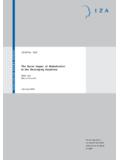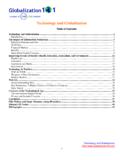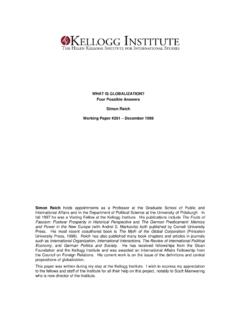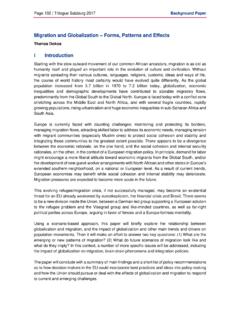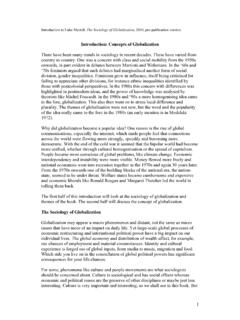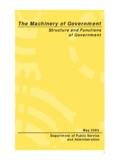Transcription of 8-Globalization and the Nation-State Sovereignty and State ...
1 US-China Education Review B 2 (2011), 243-250 Earlier title: US-China Education Review, ISSN 1548-6613 globalization and the Nation-State : Sovereignty and State Welfare in Jeopardy Agreement Lathi Jotia University of Botswana, Gaborone, Botswana This paper addresses the fact that although globalization cannot be resisted by the Nation-State , it is often confronted by mixed reactions from both the GN (Global North) and the GS (Global South). The essay charges that globalization has political, economic and cultural impact on the Nation-State , which ultimately impacts the issue of identity on global citizens.
2 Finally, the paper argues that globalization also has an impact on the autonomy of the Nation-State especially on the education system and policies. Keywords: GS (Global-South), GN (Global-North), education, Nation-State , global citizen and globalization Introduction Economic, social, demographic and technological forces are dramatically altering relationships among nations as well as the nature of politics, public policy, administration, institutional relations within the nation-states (Jun & Wright, 1996, p.)
3 1). The wave of globalization is certainly not resistible although often confronted with a lot of mixed reactions, which to some degree reflects a lot of frustration and dissatisfaction, especially from the GS (Global South). One of the hair-splitting arguments pertaining to globalization is that it is seen as an economic monster whose objectives include, among others, the wiping away of the Nation-State s Sovereignty especially with regard to socio-economic and political autonomy.
4 As a matter of fact, the Nation-State is seen as a toothless partner in the process and does not have the power or mandate to control or have a democratic voice pertaining to the principles and policies under which the globalization gospel is advanced. Contrarily, some schools of thought maintain that globalization has significantly progressed as an economic, social, technological and politically integrative process, because of the sound involvement of the Nation-State through the liberalization and rapid expansion of the markets as well as the harmonization of trade.
5 However, at the turn of the millennium, realities proved that a lot of poor countries had and continued to have choking debts, despite being on board of the globalization ship. So the debt forgiveness was the latest panacea for relieving poverty of poor countries (Easterly, 2002, p. 124). It is, therefore, the crippling of the poor nation-states economies, among others, which triggers a lot of questions about the legitimacy of globalization as a socio-economic and political messiah to the global village.
6 The reality of the situation, however, was more different than these myths and fantasies propagated in glowing terms by the very forces that were responsible for global domination, exploitation, and mass enslavement through wage labor of the great majority of the world s population (Berberoglu, 2005, p. 1). Berberoglu further charged that globalization s focus was to liberalize markets, so that they could be easy accumulation of wealth by the world corporations at the expense Agreement Lathi Jotia, , Department of Languages and Social Sciences, University of Botswana.
7 globalization AND THE Nation-State : Sovereignty AND State WELFARE 244 of the rest of humanity which is sinking further into abject poverty and destitution. Now, the question is: What role does the nation-states play in this unbalanced globalization scale? At the tip of the tongue though, one wonders if the Nation-State has all it takes to put in place policies and modalities that would counter those that have been put in place by globalization for the sake of human development, as well as the betterment of the economies which are already flowing down the drain.
8 Kamali (1998, p. 43) reflected that although the academy had been engaged in trying to understand and explain what globalization was and how everyone was adapting to it, the preponderance of the analysis was said to have missed focus on the effects that globalization may have on the well-being of the citizens in any given nation. In view of this assertion, let it be noted, as per Kamali (1998, p. 43) that although discussions on globalization are often narrowed down to issues pertaining to the economy, globalization also embraces multifaceted factors, such as affective judgment, moral righteous, values, and a host of other socially and politically relevant variables.
9 As such, within the process of globalization , the Nation-State has multiple tributaries to deal with, beyond the economic repercussions that may emerge as a result of the dynamics of the process itself. Burbules and Torres (2000, p. 14) asserted that globalization had some crucial characteristics which had major impact on the Nation-State . They categorized the factors in economic terms (where there is rise in internationalized advertising and consumption patterns; a reduction in barriers to the free flow of goods, workers and investments across national borders.)
10 And, correspondingly, new pressures on the roles of worker and consumer in society), political terms (whereby, there is a certain loss of Nation-State Sovereignty , or at least an erosion of national autonomy and correspondingly and weakening of the notion of the citizen as unified and unifying concept, which can be characterized by the precise roles, rights, obligations and status), and finally, cultural terms (where tension grows because of the manner in which globalization brings forth more standardization and cultural homogeneity, while also bringing more fragmentation through the rise of locally oriented movements).










